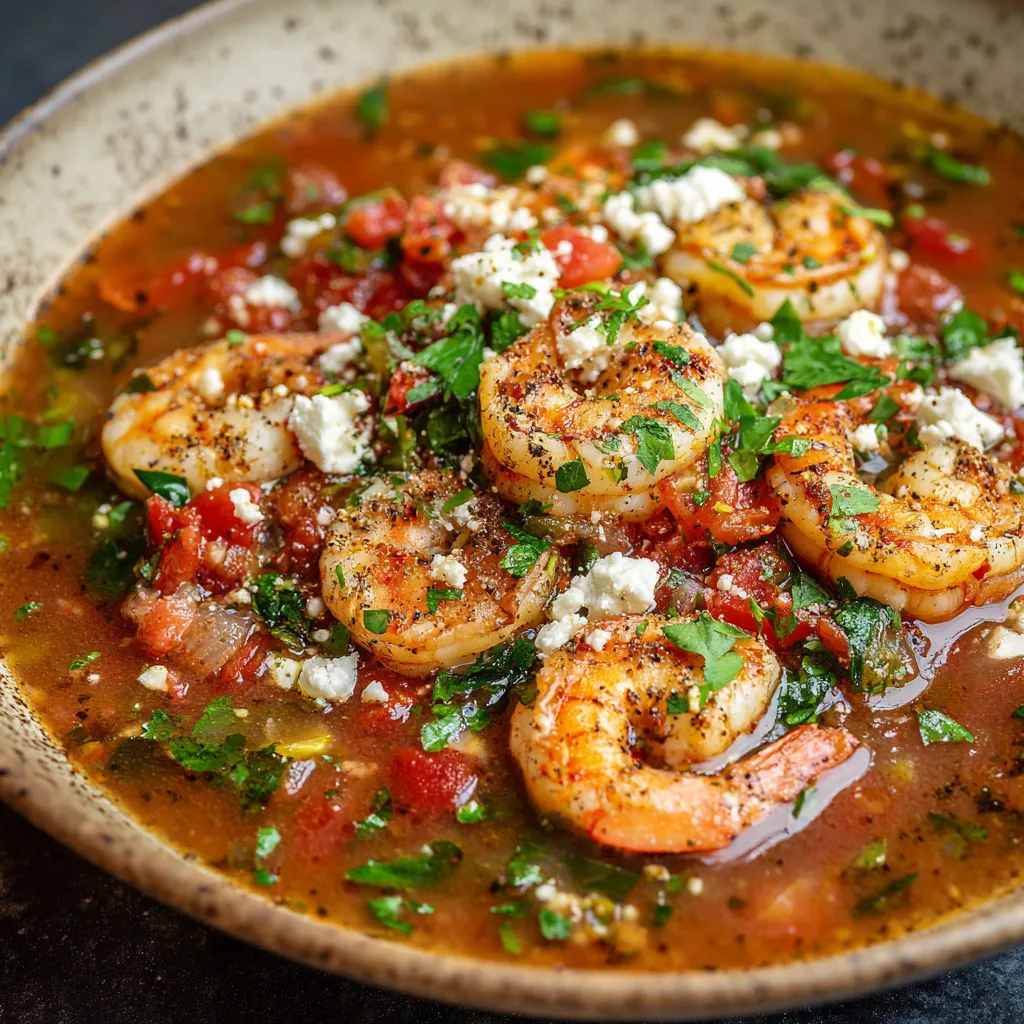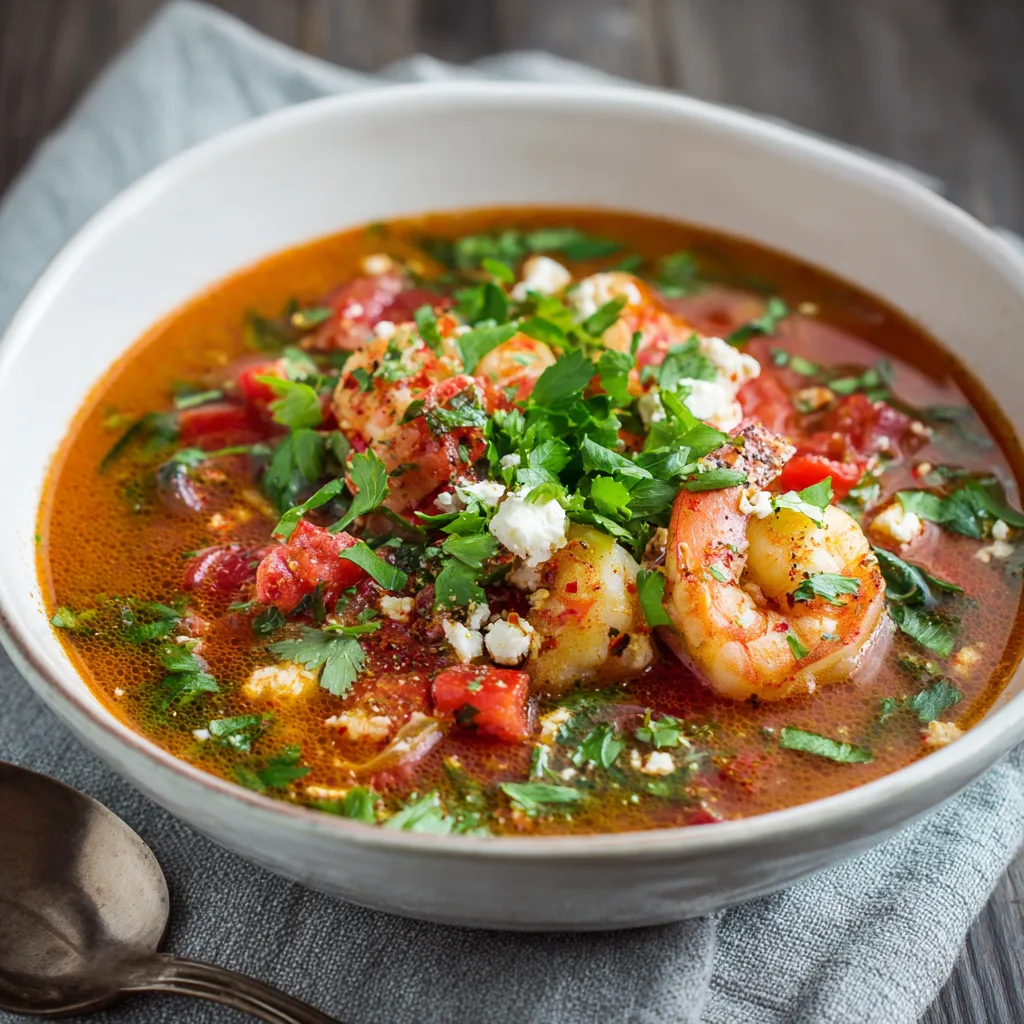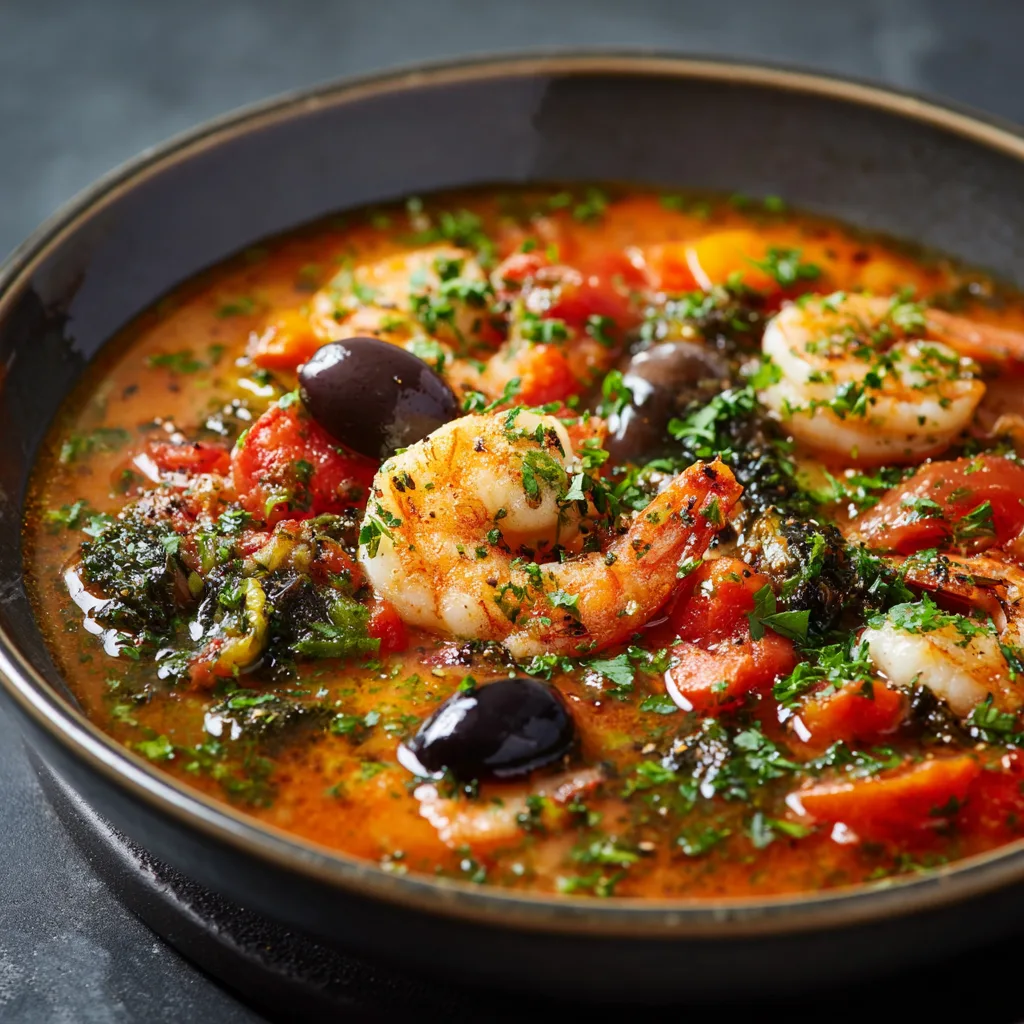High Protein Mediterranean Shrimp Soup: A Flavorful & Nutritious Delight
Overview of Mediterranean Cuisine
Mediterranean cuisine celebrates fresh, vibrant ingredients that nourish the body and excite the palate. Olive oil, seasonal vegetables, legumes, and whole grains form the foundation of these meals. Lean proteins, especially seafood, feature prominently along coastal regions, offering both taste and essential nutrients. This cuisine emphasizes balance—blending healthy fats, complex carbs, and protein-rich foods for sustained energy. Seafood dishes, such as grilled fish, mussels, and shrimp, are popular staples, providing high-quality protein and omega-3 fatty acids. Using aromatic herbs like parsley, dill, and oregano enhances flavor without adding excess calories. Mediterranean meals focus on natural flavors, making every bite satisfying and wholesome.
Importance of High-Protein Diets
Protein is crucial for muscle repair, immune support, and maintaining a feeling of fullness after meals. High-protein diets aid metabolism, stabilize blood sugar, and improve overall energy levels. Incorporating protein-rich meals daily helps sustain strength, supports recovery after workouts, and promotes healthy body composition. Foods like shrimp, poultry, legumes, and nuts are excellent protein sources that fit seamlessly into Mediterranean-style cooking. Combining protein with vegetables and healthy fats ensures nutrient-dense meals that satisfy hunger and boost vitality.
Introduction to Mediterranean Shrimp Soup
Mediterranean shrimp soup blends tender shrimp, fresh vegetables, and aromatic herbs in a nutrient-packed broth. This high-protein soup provides essential vitamins, minerals, and antioxidants while keeping calories in check. Its light yet satisfying texture makes it ideal for lunch, dinner, or post-workout recovery. The bright flavors of garlic, lemon, and fresh herbs complement the shrimp perfectly, creating a dish that is both comforting and invigorating. With each spoonful, this soup delivers health benefits, culinary appeal, and a touch of Mediterranean elegance at the table.
Nutritional Profile of Mediterranean Shrimp Soup
Macronutrient Breakdown
Mediterranean shrimp soup delivers a high-protein punch in every serving. Shrimp provides lean, easily digestible protein, supporting muscle repair and overall vitality. Each bowl typically offers 20 to 25 grams of protein, making it an excellent choice for active lifestyles. Carbohydrates come mainly from vegetables and optional whole grains, supplying energy without spiking blood sugar levels. Healthy fats, primarily from olive oil, support heart health and improve nutrient absorption. This balanced combination of protein, carbs, and fats makes the soup both satisfying and nutritionally dense. Its nutrient profile supports sustained energy, keeps hunger at bay, and fits seamlessly into a high-protein diet plan.
Micronutrients and Health Benefits
This soup is rich in essential vitamins and minerals. Tomatoes and bell peppers provide vitamin C and antioxidants, which protect cells from damage. Spinach contributes iron, vitamin K, and magnesium, supporting bone health and metabolic function. Garlic and fresh herbs, such as parsley and dill, enhance flavor while offering anti-inflammatory and immune-boosting benefits. The combination of vegetables and herbs delivers a potent antioxidant mix that helps reduce oxidative stress and promotes overall wellness. Each ingredient adds both taste and targeted nutrients, creating a meal that nourishes the body on multiple levels.
Comparison with Other Shrimp Soups
Compared to traditional shrimp soups, the Mediterranean version stands out for its nutritional density. Many conventional recipes include heavy cream or butter, increasing calories and saturated fat. In contrast, this soup uses olive oil and fresh produce, providing heart-healthy fats and antioxidants. It contains fewer refined carbs while offering more vitamins and minerals per serving. The lean protein from shrimp supports muscle health without excess calories. Overall, Mediterranean shrimp soup provides a lighter, more nutrient-rich alternative that satisfies hunger, supports health goals, and highlights the fresh, vibrant flavors characteristic of Mediterranean cuisine.
Key Ingredients and Their Benefits
Shrimp: Lean Protein and Nutrient Powerhouse
Shrimp is a standout protein source, offering high-quality, easily digestible protein that supports muscle repair and overall health. Each serving is low in calories and fat, making it perfect for weight-conscious meals. Beyond protein, shrimp provides essential minerals like selenium and iodine, which support thyroid function and immune health. Omega-3 fatty acids in shrimp promote heart and brain health, contributing to reduced inflammation and improved cardiovascular function. Its tender texture and mild flavor allow it to absorb the vibrant flavors of Mediterranean herbs and spices, making it both nutritious and delicious. Including shrimp in this soup ensures each bowl delivers a substantial protein boost while keeping the dish light and satisfying.
Vegetables: Vitamins, Minerals, and Antioxidants
Fresh vegetables are the backbone of Mediterranean shrimp soup, adding flavor, color, and essential nutrients. Tomatoes are rich in lycopene, an antioxidant that supports heart health and protects against cellular damage. Spinach provides iron, vitamin A, and vitamin C, promoting energy, vision, and immunity. Bell peppers contribute vitamin C and antioxidants, enhancing both flavor and nutritional value. Combined, these vegetables create a nutrient-dense base that supports overall wellness. They provide natural sweetness and texture while delivering fiber, which aids digestion and helps maintain stable blood sugar levels.
Herbs and Spices: Flavor with Functional Benefits
Herbs and spices enhance taste and nutrition simultaneously. Garlic is known for its immune-boosting and anti-inflammatory properties, adding a savory depth to the soup. Fresh parsley and dill offer bright flavors while supplying vitamins A, C, and K. Lemon juice adds a refreshing citrus note and a dose of vitamin C, which supports collagen production and immune health. These ingredients elevate the soup’s flavor profile without extra calories, making every bite aromatic and satisfying.
Broth and Base Ingredients: Heart-Healthy and Flavorful
Olive oil forms the healthy fat base of the soup, providing monounsaturated fats that support heart health. It also helps the body absorb fat-soluble vitamins from vegetables. The choice of vegetable or chicken broth adds depth and richness to the soup without relying on heavy creams or saturated fats. A well-seasoned broth brings together all ingredients, creating a cohesive, savory flavor while enhancing the nutritional benefits of the vegetables, herbs, and shrimp.
Preparation and Cooking Techniques
Preparing the Ingredients
Successful Mediterranean shrimp soup starts with careful preparation. Begin by cleaning and deveining shrimp to ensure a fresh, tender texture. Chop vegetables, including tomatoes, bell peppers, and spinach, into uniform pieces for even cooking. Mince garlic and fresh herbs like parsley and dill to release their aromatic oils. Measure spices and liquids precisely to balance flavor. Preparing ingredients in advance streamlines the cooking process, allowing each element to combine seamlessly in the final soup. This step ensures that the shrimp cooks perfectly and the vegetables retain their color, texture, and nutrients. Organized preparation also reduces stress and keeps the cooking process efficient.
Cooking the Soup
Start by heating olive oil in a large pot over medium heat. Sauté onions and garlic until fragrant and lightly golden, which builds a flavorful base. Add chopped vegetables and cook until they begin to soften, releasing their natural sweetness. Pour in vegetable or chicken broth and bring the mixture to a gentle simmer. Add shrimp and cook just until they turn pink and opaque, avoiding overcooking for a tender bite. Finish with fresh herbs and a squeeze of lemon juice, which brightens the flavors and adds a refreshing citrus note. This method highlights the natural taste of each ingredient while keeping the soup light and nutritious.
Tips for Enhancing Flavor
Small adjustments can elevate this soup to a culinary standout. Taste and adjust seasoning with salt and pepper as needed. For a subtle kick, incorporate red chili flakes or a small diced chili while sautéing aromatics. Using homemade broth instead of store-bought enhances depth and richness without extra sodium or additives. Fresh herbs should be added at the end to preserve their brightness and aroma. Additionally, letting the soup rest for a few minutes before serving allows flavors to meld beautifully, ensuring each spoonful delivers balanced, savory, and vibrant taste.
Serving Suggestions and Variations
Traditional Serving Methods
Mediterranean shrimp soup shines when served simply yet thoughtfully. Pairing it with crusty whole-grain bread allows diners to soak up the flavorful broth, adding texture and heartiness. A light Mediterranean salad, featuring fresh greens, cucumbers, and tomatoes, complements the soup’s vibrant flavors while keeping the meal balanced and refreshing. Serving the soup hot ensures that each ingredient’s aroma and taste are fully appreciated. Presentation matters: garnish with a sprinkle of fresh parsley or a thin lemon slice to enhance visual appeal and invite the first savory bite. These classic methods maintain the soup’s authenticity while providing a satisfying, nutritious meal.
Variations to Suit Dietary Preferences
This soup adapts easily to different dietary needs. For a gluten-free version, simply use gluten-free pasta or omit it entirely, relying on vegetables and shrimp for substance. Dairy-free diets are accommodated naturally since the soup uses olive oil instead of cream or butter. To create a low-carb option, reduce or eliminate carbohydrate-rich ingredients such as pasta or potatoes, focusing on vegetables and protein for fullness. Each variation preserves the soup’s flavor profile and nutritional benefits, ensuring that everyone at the table can enjoy a wholesome, high-protein meal.
Creative Twists
For adventurous cooks, this soup invites experimentation. Adding other seafood like scallops, mussels, or clams enriches flavor and increases protein content. Swap or mix herbs such as basil, oregano, or thyme to introduce new aromatic layers. Spice enthusiasts can experiment with cumin, coriander, or a touch of smoked paprika for depth and warmth. Small tweaks like these maintain the soup’s Mediterranean essence while offering exciting taste variations. Creativity in ingredients keeps the recipe dynamic and allows repeated enjoyment without monotony.
Frequently Asked Questions About Mediterranean Shrimp Soup
Can I use frozen shrimp for this recipe?
Yes, frozen shrimp works perfectly. Make sure to thaw them fully and drain excess water before cooking. This prevents the soup from becoming watery and ensures the shrimp cooks evenly while staying tender.
How can I make this soup spicier?
Add red pepper flakes or a small diced chili pepper during the sautéing step. This introduces a gentle heat that complements the fresh vegetables and herbs without overpowering the shrimp’s delicate flavor.
Is this soup suitable for a low-carb diet?
Absolutely. For a low-carb version, omit pasta or substitute with a low-carb alternative like spiralized zucchini or shirataki noodles. The soup remains filling thanks to the shrimp and nutrient-rich vegetables.
Can I prepare this soup in advance?
Yes, this soup keeps well in the refrigerator for up to two days. Store in an airtight container and reheat gently on the stovetop to maintain texture and flavor. Avoid overcooking the shrimp during reheating to prevent toughness.
What can I serve with this soup?
Pair it with a light Mediterranean salad featuring cucumbers, tomatoes, and fresh herbs. Crusty whole-grain bread also works beautifully to soak up the flavorful broth, creating a balanced, satisfying meal for lunch or dinner.




